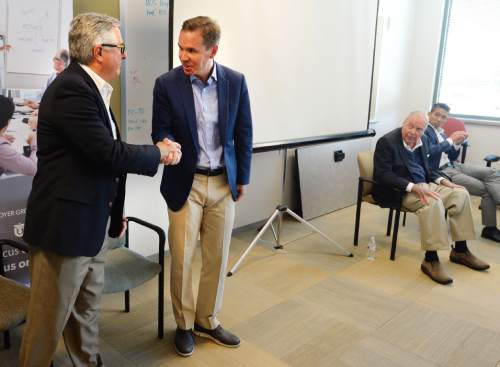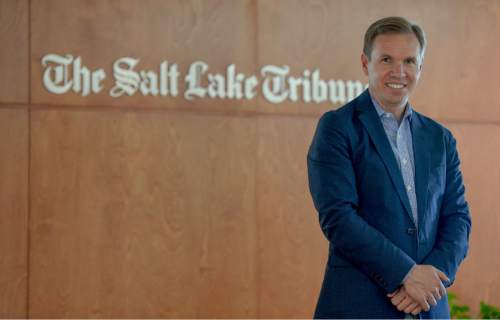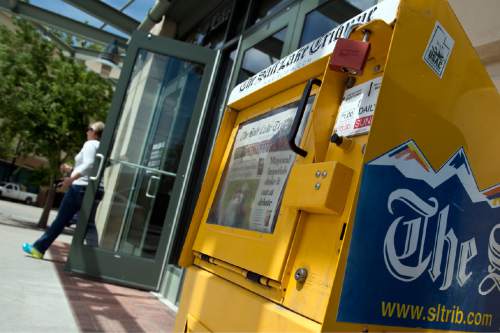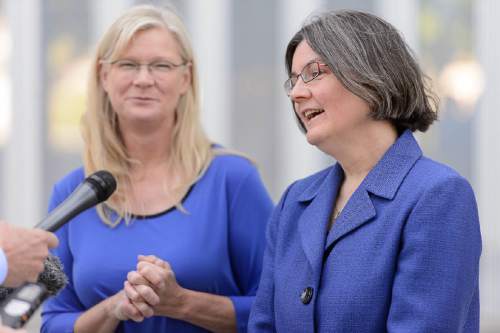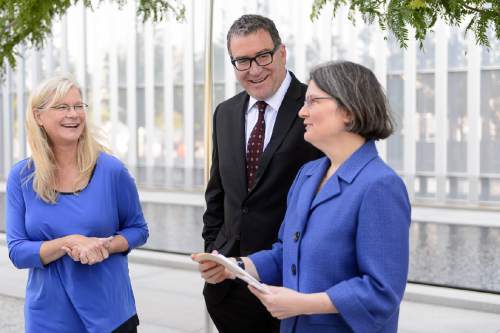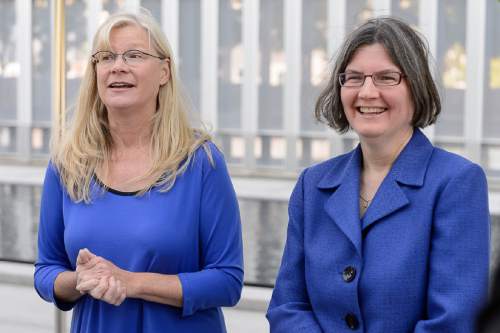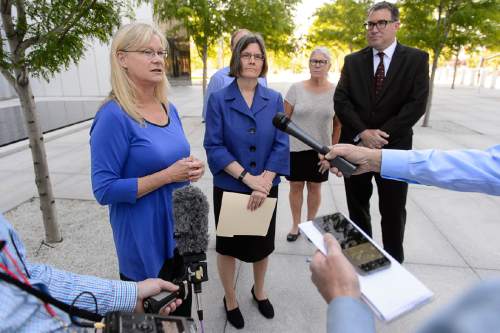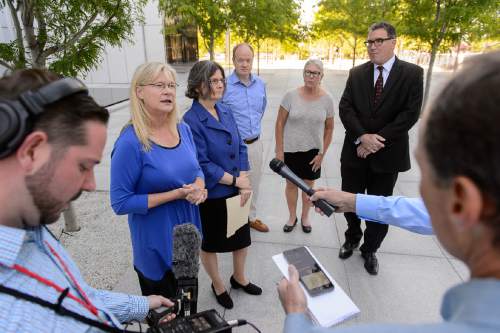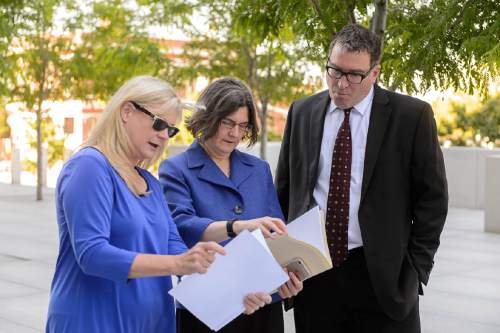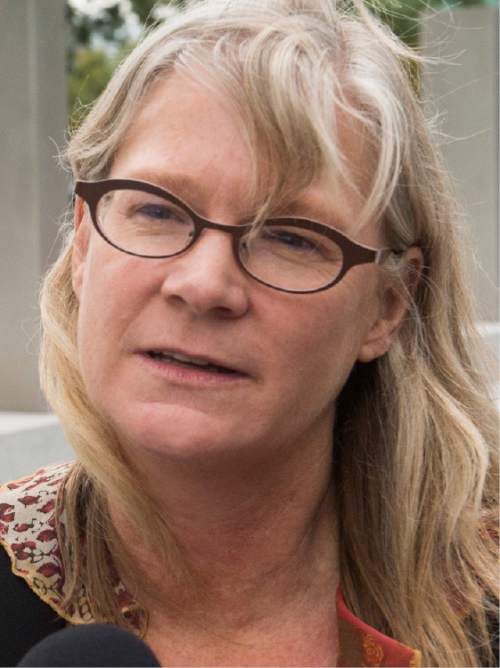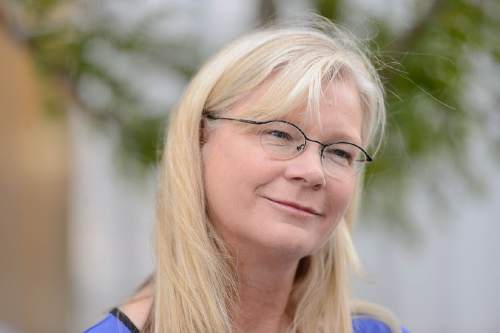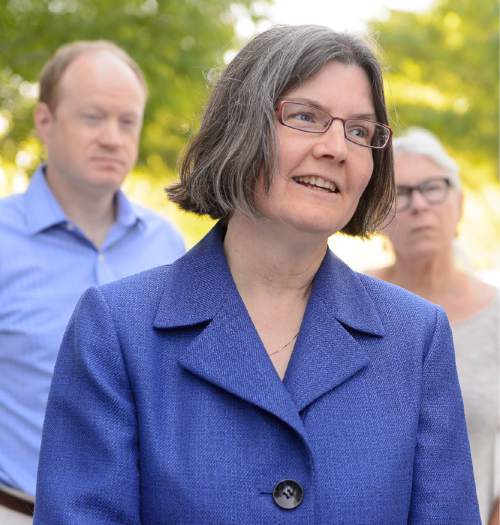This is an archived article that was published on sltrib.com in 2016, and information in the article may be outdated. It is provided only for personal research purposes and may not be reprinted.
After years of negotiations, final pieces of The Salt Lake Tribune's ownership fell quickly into place Tuesday.
The last steps were completed for the newspaper's sale by New York-based Digital First Media to Utah businessman Paul Huntsman. Within minutes, a grass-roots group suing The Tribune and rival Deseret News over their business partnership dropped its 2-year-old federal lawsuit.
And an investigation by the U.S. Department of Justice into the dailies' shared business operations also went away, with a newly reworded joint-operating contract between the two newspapers.
"We are pleased that the Deseret News and The Salt Lake Tribune have restructured their relationship to eliminate concerns about the continued publication of The Tribune," a DOJ spokesman said. "Readers in Salt Lake City will continue to benefit from rivalry between the two daily newspapers."
Huntsman — son of industrialist-philanthropist Jon Huntsman Sr. — confirmed Tuesday that The Tribune's sale had closed but declined to comment further. But in a letter to readers as the paper's new publisher, Paul Huntsman said he had purchased The Tribune "for the betterment of the community and to sustain an independent voice for future generations."
The nonprofit Citizens for Two Voices filed early Tuesday to withdraw its lawsuit challenging an October 2013 reworking of a longstanding business partnership between the two Salt Lake City dailies, saying its main concerns were addressed.
Joan O'Brien, head of Citizens for Two Voices and a former Tribune staffer, said renegotiated contract terms between The Tribune and News that boost The Tribune's share of joint profits from 30 percent to 40 percent "will allow The Tribune to survive long term."
O'Brien said the group also secured changes to a controversial veto clause in the 2013 Tribune-News joint-operating agreement (JOA) that had given News managers what Citizens for Two Voices called "unfettered" control over future Tribune ownership.
The updated veto clause, included in the latest JOA, now reads that the News' consent on future Tribune owners "shall not be unreasonably withheld."
After what it described as "due diligence" in reviewing Huntsman's purchase and related details with industry experts, the group said it was satisfied with the new terms, saying they resolved issues raised by the suit.
"For now, we join in wishing the newspaper and its new ownership extended, deservedly earned success," Harry Fuller, group board member and a former editorial page editor for The Tribune, said in a statement.
Private talks with Huntsman since the sale was announced in mid-April had convinced the group of community members and former Tribune employees that Huntsman was sincere in his assurances he would protect the newspaper's editorial independence.
"Mr. Huntsman answered our questions candidly and in good faith," board member and former Tribune reporter Patty Henetz said.
Tribune Editor Terry Orme, who will retain that post, said he is optimistic about the paper's future.
"We had an untenable future with our former owners," Orme said. "We didn't have anyone in our corner fighting for us in a business sense. And now I really feel we do."
Orme declined to comment on what impact the new profit split would have on The Tribune's bottom line.
The Deseret News, owned by The Church of Jesus Christ of Latter-day Saints, congratulated The Tribune and Huntsman on the sale.
"Although partnership percentages in the JOA have shifted over the years," the News said in a statement, "the ownership and editorial control of each newspaper have remained strictly separate and independent."
Citizens for Two Voices, also called the Utah Newspaper Project, formed in fall 2013, a few weeks after executives for the News and Digital First Media signed a new version of the dailies' long-term partnership. The deal cut in half The Tribune's cash from the JOA and sold its ownership in a West Valley City printing plant — in exchange for a one-time payment of up to $25 million from the News.
The group's lawsuit, which targeted The Tribune and the News, survived a motion to dismiss the case and had moved to a contentious exchange of business documents related to the JOA and a challenge to Citizens for Two Voices' legal standing when the litigation was withdrawn.
With the one-page motion to dismiss filed Tuesday, which does not require approval by U.S. District Judge Jill N. Parrish, Citizens for Two Voices gives up the right to resume the legal challenge, unless additional issues surface.
Karra Porter, the group's main lawyer, said that by challenging the October 2013 JOA provisions, the legal action had been instrumental in helping The Tribune dodge further layoffs, reduced circulation and possible closure.
"If they hadn't filed this lawsuit, The Tribune might still be operating, but it would be in the death spiral," Porter said. Pointing to the plaintiffs in the case, she said, "These guys saved The Tribune."
In dropping its challenge, the group maintained its allegations that the accord had thrust The Tribune "into a downward spiral, as the paper would not have the revenue necessary to finance its news gathering."
"Those familiar with Tribune operations now openly acknowledge the deal would have doomed the paper," the group said.
Citizens for Two Voices will remain active to monitor the Tribune-News partnership "to ensure the public interest is served in our unique marketplace of ideas," said board member Ted McDonough."
With the profit share revised to 40 percent and other revenue sources to tap, the group expects The Tribune to "survive long term."
Orme said the added revenue sources would come through new strategies on digital advertising still under discussion.
In his letter to readers, Huntsman acknowledged widespread challenges in the news industry, sparked by shifting preferences for news delivered on computers and mobile devices.
"Only bold strategies, technological upgrades, creative products and selective efficiencies," he wrote, "will give The Tribune financial health and the long-term ability to make a difference."
Twiter: @TonySemerad


